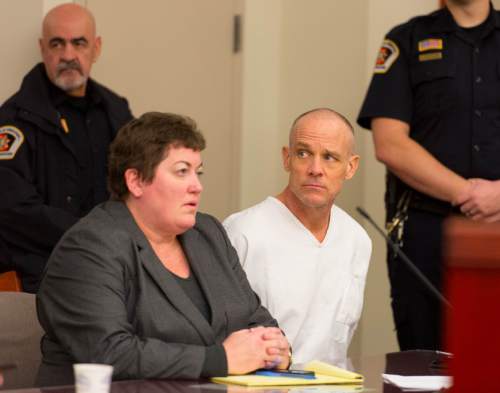This is an archived article that was published on sltrib.com in 2015, and information in the article may be outdated. It is provided only for personal research purposes and may not be reprinted.
A jury of five men and five women will decide the fate of two brothers accused of bilking investors in the failed ski-in-and-ski-out Mount Holly resort development near Beaver — a case with ties to the bribery scandal that left two former Utah attorneys general facing criminal charges.
The 3rd District Court trial of brothers Marc Sessions Jenson and Stephen R. Jenson is expected to last nine days and includes a witness list of Utah notables, including former attorneys general Mark Shurtleff and John Swallow.
Opening statements in the case are scheduled for Wednesday morning, with prosecutors and both of the two defense attorneys — Marcus Mumford, who represents Marc Jenson, and Edward Stone, who represents Stephen R. Jenson — limited to 20 minutes each to make an initial case.
Jury selection in the high-profile case took nearly two full days. It began with last week with pool of more than 100 potential jurors, who filled out questionnaires to discern, in part, how much media coverage they may have seen.
The case against the Jensons was originally filed in 2011, when Shurtleff was still Utah's top cop and Swallow was his chief deputy.
Marc Jenson contends the case is a political payback for his refusal to comply with a "shakedown" by Shurtleff and Swallow, whom he claims squeezed him for cash, favors and luxury treatment at his Southern California villa. He raised the allegations in 2013, becoming a key figure in the bribery and corruption scandal that saw Shurtleff and Swallow charged with multiple felonies in July 2014.
Both men, who maintain their innocence in their respective criminal cases, have been subpoenaed to testify by Marc Jenson's defense. Attorneys for both Shurtleff and Swallow have filed objections to those subpoenas.
Mumford told the court Tuesday he will file motions to compel testimony from them and from alleged victims in the case who have also objected.
The Jenson case is now being prosecuted by the Utah County Attorney's Office, which took it over in 2013, after attorneys for Marc Jenson argued the Attorney General's Office had a conflict of interest. The Jensons have both pleaded not guilty to multiple counts of communications fraud and money laundering. If they are convicted of the second-degree felonies, they face a punishment of up to 15 years in prison on each count.
Prosecutors say the brothers — who tried to turn the former Elk Meadows ski area into a $3.5 billion development with ritzy homes, a private ski mountain and a Jack Nicklaus-designed golf course — failed to disclose required information to investors, including that Marc Jenson had served time in prison for not paying taxes and had filed for bankruptcy.
Lawyers for the Jensons maintain the project was a legitimate enterprise that fell apart when the New York-based hedge fund that had backed the resort cut off the flow of funding, leaving the Jensons unable see it through.
"This was not some sort of sham or shell game," Stone said in an interview with The Salt Lake Tribune last week. "This was a real thing; plats had been approved and the plans were done."
The ski resort later opened under different owners and management and is operated as Eagle Point Resort.
The defense witness list includes Olympic champion skier Ted Ligety, whom the brothers had tapped as their director of skiing. Ligety also has filed an objection.
Nicklaus, the legendary golfer, also is on the defense witness list but has not been subpoenaed.



